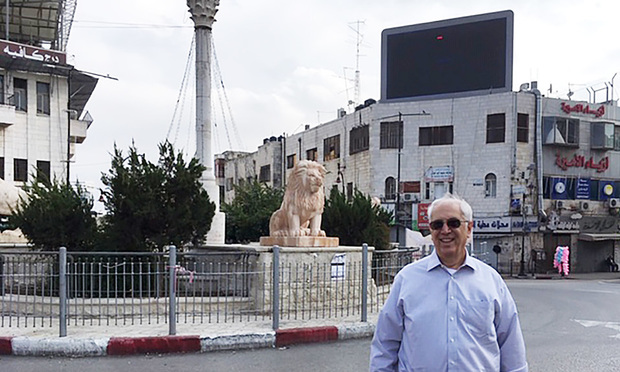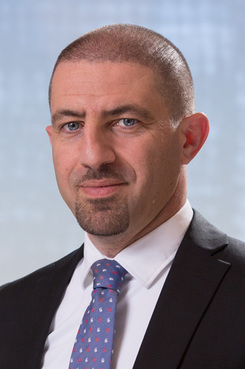Palestinian and Jewish Lawyers Enjoy Normal, Unusual Friendship
At the least, their business together highlights legal practice in an area known only for strife. At the most, their friendship is an example for peaceful co-existence.
December 11, 2018 at 06:01 PM
5 minute read
 Abe Schear of Arnall Golden Gregory visits Ramallah in November 2018. (Courtesy photo)
Abe Schear of Arnall Golden Gregory visits Ramallah in November 2018. (Courtesy photo)
This is commonplace: Two lawyers meet at a conference, establish a friendship, refer work to each other and share a meal when one is in the other's neighborhood.
But when one lawyer is a Jewish American from Atlanta active in pro-Israel causes and the other is a Muslim Palestinian from the West Bank, well, that's unusual, isn't it?
At the least, their business together highlights legal practice in an area known only for strife. At the most, their recent lunch in the Palestinian city of Ramallah sounds like a recipe for peaceful co-existence.
 Rasem Kamal of Kamal & Associates, Ramallah. (Courtesy photo)
Rasem Kamal of Kamal & Associates, Ramallah. (Courtesy photo)If only it were that simple. Yet, to hear Abe Schear of Atlanta tell the story, his friendship with Rasem Kamal of Ramallah is like any other relationship he's made in 42 years of real estate and international business practice.
“One of things that we're all victims of,” says Schear, “is the news oftentimes is very conflict driven—personal conflict, country conflict, cultural conflict. The truth is Rasem and I have a great deal in common. We have personal things in common; we share family issues; we have similar aspirations for our careers.”
Kamal says, “Obviously we share different perspectives of the [Palestinian-Israeli] conflict and have different perceptions.”
But at their lunch last month, Kamal invited some of his colleagues in the Palestinian bar (which includes about 11,500 lawyers, he says) to meet Schear. “It was fascinating,” says Kamal, speaking on a conference call with Schear and a reporter. “We had a beautiful exchange, about everything—about law, local investment, politics” and personal matters.
Schear chimes in that Kamal's wife, Ala, recently gave birth to their third child.
Kamal, 41, received an undergraduate degree from the University of Jordan in Amman, an MBA from Northwestern University and Tel Aviv University and an LL.M. from the University of San Francisco, where he was a Fulbright Scholar.
He started Kamal & Associates in 2007, and it has grown to nine lawyers—one of the biggest in the Palestinian bar, he estimates—offering a host of business law practices. Kamal says he hopes his firm will outlive him, a practice he says is “unheard of” in his part of the world.
Schear, 67, is a partner at 165-lawyer Arnall Golden Gregory. Along with representing retail and office landlords and tenants throughout the United States, he introduces investors to investment opportunities internationally. Among many community efforts, he co-chairs the Israeli Consulate's Lawyers' Committee and is active in the American Israel Public Affairs Committee and the Jewish National Fund.
Schear also co-chairs the law firm management committee of the International Bar Association, the group that facilitated his meeting Kamal.
At a conference in Tokyo in 2014, Schear was sitting on a panel when, at the end, Kamal asked a question, starting by saying he was from Palestine. Heads turned, says Schear, because “there are not many members from that area.”
After the event, Schear introduced himself to Kamal, saying he did work in Israel. A friendship began. On subsequent business trips to Tel Aviv, Schear met Amal for dinner there, and the second time each brought his wife.
When Schear went back to Israel last month, he accepted Kamal's invitation for lunch in Ramallah, which houses the Palestinian Authority's government in the West Bank.
Taxis don't cross borders, he says, so, “You have to figure out a way to access from point to point.” Kamal arranged to pick Schear up personally in Jerusalem, which is a half-hour drive from Ramallah.
Although Schear and Kamal were able to meet personally, the borders and restrictions keep lawyers busy.
Driving to and from Israel varies in difficulty “depending on the situation,” Kamal says, presumably referring to shifting political and military situations. He has legal work in Gaza, but he says it is ”almost impossible” for him to go there physically, so he has to rely on other lawyers in that territory.
Schear and Kamal are working on an intellectual property matter concerning a franchise, and Schear has introduced Kamal to some attorneys in Israel. ”They need Rasem and his firm to help facilitate business in the West Bank,” where laws and courts are different than in Israel.
“You need attorneys on both sides of the border,” he adds, to deal with property disputes and sales of property.”
“These are very complicated,” he adds.
Schear says he has been pleasantly surprised that “the people I know in the Israeli bar are incredibly willing to work with Rasem, and they know that that's important both for the business and for the region.”
This content has been archived. It is available through our partners, LexisNexis® and Bloomberg Law.
To view this content, please continue to their sites.
Not a Lexis Subscriber?
Subscribe Now
Not a Bloomberg Law Subscriber?
Subscribe Now
NOT FOR REPRINT
© 2025 ALM Global, LLC, All Rights Reserved. Request academic re-use from www.copyright.com. All other uses, submit a request to [email protected]. For more information visit Asset & Logo Licensing.
You Might Like
View All
Alston & Bird Adds M&A, Private Equity Team From McDermott in New York
4 minute read

Lawyers Share Concerns, Predictions Over How Bondi’s Loyalism to Trump May Impact DOJ
6 minute read
Alston & Bird, Eversheds Sutherland Ranked Among Top Firms Globally for M&A Deals in 2024
5 minute readTrending Stories
Who Got The Work
J. Brugh Lower of Gibbons has entered an appearance for industrial equipment supplier Devco Corporation in a pending trademark infringement lawsuit. The suit, accusing the defendant of selling knock-off Graco products, was filed Dec. 18 in New Jersey District Court by Rivkin Radler on behalf of Graco Inc. and Graco Minnesota. The case, assigned to U.S. District Judge Zahid N. Quraishi, is 3:24-cv-11294, Graco Inc. et al v. Devco Corporation.
Who Got The Work
Rebecca Maller-Stein and Kent A. Yalowitz of Arnold & Porter Kaye Scholer have entered their appearances for Hanaco Venture Capital and its executives, Lior Prosor and David Frankel, in a pending securities lawsuit. The action, filed on Dec. 24 in New York Southern District Court by Zell, Aron & Co. on behalf of Goldeneye Advisors, accuses the defendants of negligently and fraudulently managing the plaintiff's $1 million investment. The case, assigned to U.S. District Judge Vernon S. Broderick, is 1:24-cv-09918, Goldeneye Advisors, LLC v. Hanaco Venture Capital, Ltd. et al.
Who Got The Work
Attorneys from A&O Shearman has stepped in as defense counsel for Toronto-Dominion Bank and other defendants in a pending securities class action. The suit, filed Dec. 11 in New York Southern District Court by Bleichmar Fonti & Auld, accuses the defendants of concealing the bank's 'pervasive' deficiencies in regards to its compliance with the Bank Secrecy Act and the quality of its anti-money laundering controls. The case, assigned to U.S. District Judge Arun Subramanian, is 1:24-cv-09445, Gonzalez v. The Toronto-Dominion Bank et al.
Who Got The Work
Crown Castle International, a Pennsylvania company providing shared communications infrastructure, has turned to Luke D. Wolf of Gordon Rees Scully Mansukhani to fend off a pending breach-of-contract lawsuit. The court action, filed Nov. 25 in Michigan Eastern District Court by Hooper Hathaway PC on behalf of The Town Residences LLC, accuses Crown Castle of failing to transfer approximately $30,000 in utility payments from T-Mobile in breach of a roof-top lease and assignment agreement. The case, assigned to U.S. District Judge Susan K. Declercq, is 2:24-cv-13131, The Town Residences LLC v. T-Mobile US, Inc. et al.
Who Got The Work
Wilfred P. Coronato and Daniel M. Schwartz of McCarter & English have stepped in as defense counsel to Electrolux Home Products Inc. in a pending product liability lawsuit. The court action, filed Nov. 26 in New York Eastern District Court by Poulos Lopiccolo PC and Nagel Rice LLP on behalf of David Stern, alleges that the defendant's refrigerators’ drawers and shelving repeatedly break and fall apart within months after purchase. The case, assigned to U.S. District Judge Joan M. Azrack, is 2:24-cv-08204, Stern v. Electrolux Home Products, Inc.
Featured Firms
Law Offices of Gary Martin Hays & Associates, P.C.
(470) 294-1674
Law Offices of Mark E. Salomone
(857) 444-6468
Smith & Hassler
(713) 739-1250






